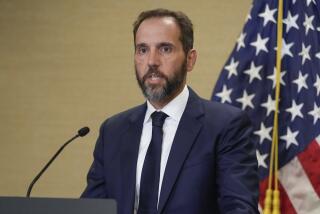Both Sides Seeking Sanctions
Both sides in the Kobe Bryant sexual assault case asked Tuesday that the judge impose sanctions for misconduct.
Citing a pattern of the prosecution missing deadlines and ignoring court orders, Bryant’s attorneys requested that the charge be reduced from a Class 3 to a Class 4 felony, which would remove the allegation that Bryant used force in overcoming his accuser’s will and reduce the potential sentence.
Prosecutors requested that Judge Terry Ruckriegle either disallow the testimony of defense DNA expert Elizabeth Johnson or give them an extension until June 24 to file a report from Henry Lee, the prosecution expert whose testimony is expected to rebut Johnson’s findings. Most of Johnson’s DNA test results and testimony is under seal.
Bryant, 25, has pleaded not guilty and has said he and the 19-year-old woman had consensual sex at a Colorado mountain resort June 30.
A trial date has not been set, and pretrial hearings are scheduled Monday and Tuesday in Eagle County court.
Legal experts said it is doubtful that Ruckriegle will impose a sanction as drastic as reducing the charge.
“I don’t think the judge would sanction the prosecution absent some finding of intentional bad faith,” said Craig Silverman, a former Denver prosecutor who has followed the case.
Ruckriegle warned prosecutors June 4 that they could face sanctions for not following a court order to allow a defense expert to observe the retesting of DNA evidence. Prosecutors chose a laboratory, Bode Technology, that does not permit the presence of defense experts.
Bryant’s attorneys responded to that by suggesting that Ruckriegle dismiss the case. However, the court filing Tuesday did not go that far, asking that the charge be reduced or that the prosecution be barred from challenging the defense DNA test results at trial.
The sentence for a Class 4 sexual assault conviction is two years to life in prison or 10 years to life on probation. Currently, Bryant faces four years to life in prison or 20 years to life on probation.
“Given the history of prosecution delay regarding defense access to crucial physical evidence in this case -- which is replete in the record -- sanctions are appropriate,” attorney Pamela Mackey said.
Mackey said prosecutors ignored letters from the defense in November and January requesting DNA samples for independent testing. The samples were not provided to the defense until Ruckriegle issued an order in January.
Krista Flannigan, a spokeswoman for Dist. Atty. Mark Hurlbert, said she could not comment on the defense filing.
Hurlbert asked in April that a trial date be set quickly, and Bryant was arraigned May 11. Jury selection must begin within six months of that date unless Bryant waives his right to a speedy trial.
The delays would seem to be pushing that limit, a point Ruckriegle addressed at a May 27 court hearing when he admonished Hurlbert for unnecessarily delaying the proceedings.
During that same hearing, the judge said, “The difficulty in setting a trial date is that we cannot anticipate an ultimate resolution of a number of issues relating to motions that have been filed, and particularly DNA, until we have those results.”
Hurlbert said that at least one of those delays is the fault of the defense. In his filing, he said Bryant’s attorneys were late in providing to prosecutors the necessary data for Lee to formulate a response to Johnson’s DNA results.
“This delay will slow this case down even further and the people feel that sanctions are appropriate,” Hurlbert wrote.
More to Read
All things Lakers, all the time.
Get all the Lakers news you need in Dan Woike's weekly newsletter.
You may occasionally receive promotional content from the Los Angeles Times.







